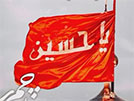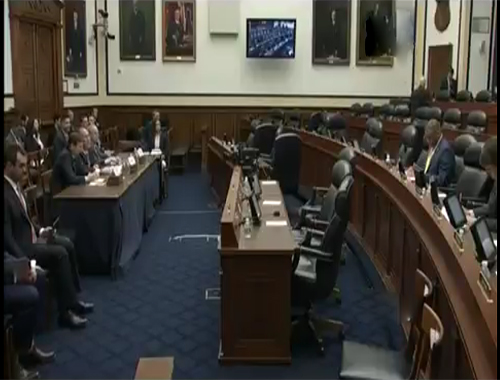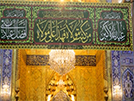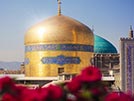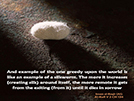Chapter 5
- Details
- Hits: 4308
Chapter 5
--------------------------------------------------------------------------------
History bears witness that Abuzar was so much enlightened after embracing Islam that he became without a parallel. He achieved such perfection in purity of faith and sincerity of heart that he proved to be a beacon light for the people of insight. He enriched the people's mind with his counsels, after the appearance of Islam, taught them the lesson of equality and love, and showed them the way of obedience to Allah and the Holy Prophet.
His Islamic life had been so dignified that it had no parallel. Abdullah Subaiti writes that Abuzar was distinguished among those companions who excelled in piety, abstemiousness, worship of Allah, truthfulness, firmness in faith and peerless in resignation to the Will of Allah. His daily diet was, during the life time of the Holy Prophet, three kilo of dates and he maintained it throughout the rest of his life.
He further writes that he was so elevated in morality and virtue that the Holy Prophet had to include him, like Salman Farsi, in Ahlul Bayt (People of his House). Hafiz Abu Na'im says that Abuzar was a devout worshipper, a man of piety and had a highly contented heart. He was the fourth person to have embraced Islam .He had given up all evils even before the enforcement of Islamic law. It was his cherished goal not to bow down his head before the tyrant rulers. He stood firm in bearing pains and sorrows. He won distinction in learning by heart the traditions and exhortations of the Holy Prophet.
Abu Na'im writes that Abuzar did great service to the Holy Prophet and acquired the knowledge of the articles of faith and articles of the practice in his company, and abstained from evils. One speciality of his was that he used to ask questions from the Holy Prophet. He learnt by heart the meanings and interpretations given by him and was very greedy in this respect. In short, as far as possible, he not only satisfied himself with his questioning but gathered a vast treasure of Islamic knowledge for the followers of Islam.
Another notable deed of his life was that he treaded on the same path which the Holy Prophet meant and approved of, and for which he had commanded. He attached himself with Imam Ali after the Holy Prophet and did not forsake him at any moment. He followed him, and received benefit from his vast knowledge. He imbibed his knowledge, asceticism worship, benevolence, moral virtues and habits. That is why the Holy Prophet said; "Abuzar is the most truthful of this nation". He said at another place, "Abuzar is like Prophet Isa (Jesus) in asceticism". According to a tradition he said, "One who wants to see the austerity and modesty of Isa should look at Abuzar”.
It is obvious that the worship of a divine like Abuzar was not limited to ritual prayers only. He had practical proficiency in all the forms of worship. It is undeniable that to think over the existence of Allah and His creations is also a great worship. Abuzar was accomplished in this worship too.
Historians and traditionalists are unanimous that Abuzar had attained to the great degree of knowledge and it was because he acquired knowledge very sincerely in the company of the Holy Prophet. He put questions to the Prophet all the time and learnt his answers by heart. He had become well-versed in knowledge in his company. The author of "Kitabud Darajatur Rafi'ah" says that Abuzar was reckoned in the rank of great scholars and austeres and held a distinctive rank in scholarship. He was a senior companion of the Prophet, was one of those great persons who fulfilled their covenant with Allah, viz. who kept their promise which they had made to Him about their following the complete faith, and was one of those four personalities whose love has been made obligatory on all.
Allamah Manazir Ahsan Gilani throwing light on the lofty scholarship of Abuzar writes: "Read the testimony of Ali, the best judge out of the companions, and the Gate of Knowledge and conclude yourself that he is right when he says, "Abuzar was very greedy and avaricious”.
Is this testimony of Imam Ali does not justify Abuzar's claim? Sometimes Abuzar himself said enthusiastically, "We have separated from the Holy Prophet at a time when there has not been left a single bird flying with flapping wings in the sky, about which we have not come to know some special thing". (Tabaqat Ibn Sa'd vol. 4, p.10)
Allamah Gilani writes about the knowledge of Abuzar, "Somebody asked Imam Ali, how he considered Abuzar". He replied that ‘wa'aa 'ilman 'ajaza fihe,’ viz. "He (Abuzar) preserved knowledge which overpowered him".
You have read how sensitive he was to accept impression, and can yourself surmise from the events. That is why he was always ready to act according as he heard from the Holy Prophet. Just as he tried to hear from the Holy Prophet he wanted to put it into action without the least hesitation. It was his earnest desire to see that his action completely conformed to knowledge.
Abuzar was so determined and firm about it that he never cared for the biggest power on earth if it came in his way. Sermons and exhortations could not shake him from the stand that he had taken. Taking pride in this distinction he sometimes said, "O people! On the Day of Judgment I shall remain nearest to the Holy Prophet's assembly, because I have heard him saying that the nearest to him on the Day of Judgment will be the man who departs from the world in the same condition in which he has left him. I swear by Allah that now nobody is left among you except I who am in my original state and have not been contaminated with anything new. (Tabaqat Ibn Sa'd and Musnad Ahmad bin Hanbal).
This was not his assertion only but the leader of the world and last of the Prophets had also certified it. It is written in the Tabaqat Ibn Sa'd that one day the Holy Prophet said, "Who amongst you will come to see me (at Kauthar) in the same condition in which I leave him". Abuzar said, "I". The Prophet said in reply to it, "You are true", i.e. you will die in the same state of faith in which I leave you.
Imam Ali also used to say, “Now there is nobody left who does not fear the taunt and sarcasm of the reproacher in matters of Allah, except Abuzar”.
Hence 'ajaza fihe clearly means that Abuzar had been overpowered by his knowledge and information. He did not have control over doing against what he knew.
In other words, Abuzar acquired knowledge, knew its reality and basis and propagated it well. He never cared about anybody's reproach in communicating to the people the learnings which he had gathered from the Prophet. He was never cowed by any government. He was not moved by the politics of Mu'awiyah, nor was he overawed by the wealth of Uthman; but he called right, what the Prophet had called right, till he breathed last. He acted upon the principles and learnings as explained by the Holy Prophet and also repeated them verbally till he was exiled and died in a remotest place.
It is quoted from, the Commander of the Faithful, Imam Ali, in the book "al-Isti'ab" that Abuzar knew some of those secrets of knowledge which other people were unable to bear, and confined them to himself only.
Hafiz Basri writes in "Al-Mashariq" that faith has ten stages. One who has attained to the first stage, does not know the limits of the faith of the person who is in the second stage, and the one in the second stage is ignorant of the person in the third stage, and the same is the condition of all of the ten stages. Salman Farsi was at the acme of esoteric knowledge. Abuzar held the same position in relation to Salman as Moses had in relation to Khizr.
Kharajaski has written in "Kanz" that Salman while addressing Imam Ali used to say, "Be abi anta wa ummi ya qatila Kufah ", (O’ the martyr of Kufah! May my parents be sacrificed for you). He further said, "If I disclose those facts which I know of your (Imam Ali's) real insight an excitement will be stirred up within the people".
Allamah Majlisi has quoted a hadith of the same type about Salman and Miqdad in "Sharhu Usulil Kafi".
It means that when a companion cannot gauge the extent of the learning of another companion how can the common people bear the learnings of a firm believer like Abuzar.
Ali's above quoted remark "Knowledge overpowered Abuzar" can also be seen in Tabaqatul Kubra, vol. 5, Usudul Ghabah, vol. 5, and Sunan Abu Daud.
Abdul Hamid Jaudatus Sahar in his book "Al-Ishtiraki az-Zahid" writes: "Allah wanted to do good to him so he gave him the capacity and eagerness to learn, bestowed on him conviction and truthfulness and also discerning eyes and attentive ears. Hence he memorized whatever he heard from the Prophet of Islam. He got the tradition and narrated it. He was reckoned among the great traditionalists.
Abdul Hamid writes on page 14 of the same book, "Abuzar was a muhaddith (narrator of hadith) of the first order, and spoke very fluent and eloquent Arabic. He was a model of a pious Muslim. Hence he became the most respectable of all the people. One day he was sitting in the masjid and was narrating, as usual, the traditions of the Prophet when a man expressed his wish to have seen the Prophet. Abuzar quoted the Prophet of Allah as having said that those people of his nation would love him most, who would come after him and would wish to see him even at the cost of their children and wealth".
Morality means good habits and the knowledge of morals or ethics is a kind of practical philosophy. Abuzar had attained to the highest degree of morality. Good habits of the Holy Prophet reflected in his personality. There is nothing in his character which can be criticized by a just man. Whatever he did in his lifetime was an unparalleled example of morality, and whatever he said was according to the exigencies of society .This is something different if some ignorant people regard his good habits as impolite.
Allamah Subaiti says that the examples of morality set by Abuzar deserve commendation. The narrator says, "Seeing Abuzar wrapped in a black blanket in a corner of the masjid I asked him why he was sitting there alone. He said that he had heard the Holy Prophet saying: "It is better to sit in a lonely corner than to sit amidst the bad company and it is better to sit in the company of moralists than to sit in a lonely corner. To observe silence is better than telling a bad thing and to say a good thing is better than keeping quiet".
Abuzar said that the Holy Prophet has told many things regarding the instruction in good morals. Here are seven of them:
1. Have friendship with poor people and try to keep them near yourself.
2. In order to improve your own condition have a look at the people of lesser means and do not compare yourself with the people of better means.
3. Do not beg of anybody for material help and make contentment your habit.
4. Have sympathy with your relatives and help them in their hour of need.
5. Do not hesitate to tell the truth even if the whole world turns against you.
6. Do not mind the reproaches of a blasphemous person about Allah.
7. Always keep saying, "La hawala wa la quwwata ilia billah", (There is no power except Allah). In other words Allah is the Super Power. .
Abuzar says, "Having said these things the Prophet touching my chest with his hand said, "O Abuzar! No wisdom is better than good planning, no piety is better than self-control, and no beauty is better than good morals".
Allamah Gilani quoting Musnad Ahmad bin Hanbal mentions only two precepts out of the above mentioned seven, which pertain to the friendship with the poor and to look at the people of lesser means, and then writes: "In fact, this is the best remedy of the ailment of the love for riches and love for the world. Suppose there is a man who has a shirt of Muslin and a trouser of long-cloth to wear, wheat bread and mutton to eat, and a neat and clean clay house to live in. Now, if this man compares himself with a man who has nothing except a coarse dress, a bread of barley and a cottage of straw, he will thank Allah for his better condition and will be free from the mental tortures with which he would have suffered had he compared himself to a wealthier man with costlier dresses and more delicious food. This is the best way to get worldly satisfaction and other worldly benefits. But how many of us are acting upon it today? I even say that a man will not suffer any trouble if he acts upon this principle. This is the only golden rule for this world and for the Hereafter, which is explained in the following sentence of Shaykh Sa'di, the celebrated poet of Iran.
"I wept for a pair of shoes unless I saw a man who had no feet".
After love for riches another part of the love for world is the love for status and power. This is even more dangerous and a cause for the corruption of the system of the world. The mischiefs perpetrated in the world by the slaves of wealth are much less than those caused by the over-ambitious for status and power.
The real cause of this disease is that when a man feels his own perfection in some field, he forgets the power of that Being who bestows this perfection on him, and considers himself of some consequence. Then he tries to make others, who are around him, realize his importance which he has attributed to himself. With this end in view, he prepares plans according to the power of his thinking. It is seldom seen that a slave of greed and avarice leaves any stone unturned to achieve this end. He fills his mind with hypocrisy and remains busy all the time with making the world conscious of his existence through fair and foul means. The perfection which Abuzar had achieved or was about to achieve, was that of piety. It was feared that it might produce in him pride and conceit, after which the ambition of status and honour sweeps away the peace of the world and the Hereafter. Hence the Prophet prevented it before hand and addressing Abuzar, one day, said to him in clear words:
"Allah said: O my bondmen! You are all sinners except those whom I keep safe. So all of you must be praying to me regularly for your forgiveness. I will forgive you. I forgave the sins of the person who considers Me powerful enough to redeem the sins and that I redeem them, and of the person who prayed for the forgiveness of his sins through My power".
"O my slaves! All of you are deviators except those whom I show the right path. Hence you should pray to Me for guidance. All of you are poor and needy except those whom I make affluent. Pray to Me for your livelihood and remember that if all of your alive and dead, old and young, vicious and virtuous, become united to practice abstinence there will not be the least addition to My existing realm, and if all of you dead and alive, old and young, vicious and virtuous gather together and request Me to fulfil their needs and I satisfy their requirements there will not be any deficiency in My dominion not even equal to the quantity of water taken out with the needle when somebody dips it into the ocean. This is because I am the Bountiful, Forgiver, Great, Exalted and Dominant over all ends".
Can anybody take pride in his existence or achievements and accomplishments after believing in the truthfulness of the Divine Glory and Majesty which you behold in this version? Can anybody take airs even for a moment after this? Can any believer in Allah excite sedition on the face of the earth for the sake of his station in life, honour, show and perpetuity after this? Who is crazy to be proud of his piety when everyone of us is a sinner?
When all the wealth of the rich people is under the control and authority of Allah; is not he a fool who shows vanity over the purses of money? If it is correct that our great and small cannot even untidily add a jot to the grandeur of the Divine dominion, what does a man who is only a handful of dust boast of? When this is the state of his freedom from want that even in matters of guidance and mental maturity he considers His favour and power to be the real agents, on what basis does a clergyman or a reformer consider his efforts worth appreciating?
Alas! When everything belongs to Him and we are simply poor and needy why, then, is this self-conceit and why this presumption and arrogance?
These were the commands and sermons which instilled the austerity of Prophet Isa in the spirit of Abuzar. Anyway, this was the case and even more than that the Prophet used to stir up the ascetic nature of Abuzar. But we should take special view of that side of his teachings and exhortations wherein Islam stands out distinguished from all other religions.
You must be feeling tempted to think that if this was the teaching of the Holy Prophet why did Islam oppose the monastic life and consider it one of the innovations of monks and clergymen?
I want to draw your attention to the reply of this question. Generally abstinence and piety mean to leave the cities for mountains and forests to worship Allah in seclusion. Abuzar narrates as under:
“The Holy Prophet told me that it is also a good turn to pick up stones from the path, to help the weak is also a charity and even the sexual intercourse with the wife is a charitable act. (Musnad Ahmad bin Hanbal).
I asked the Holy Prophet in astonishment, "Is it also a charity to cohabit with ones wife, although he satisfies his urge by this act? If a man satisfies his urge, will he also get a recompense for it? The Prophet said, "Well, tell me, would it not been a sin if you had satisfied this urge through some unlawful and forbidden means?" I replied, "Certainly". He said, "You people think of the sin but not of the good. Usually those leading the life of austerity give up their practice of earning and craftsmanship and afterwards when their worldly needs press them hard they are willy-nilly driven in to begging”.
The Prophet one day called me and said, "Would you like to swear allegiance on the point that after it there will be only Heaven for you". I replied, "Yes". And then I stretched out my hand. The Holy Prophet said, "I want to take word from you that you will not beg anything of anybody". I replied, "All right". He said, "Not even that whip which falls down from your horse. You should rather, get down and pick it up yourself".
Abuzar says that the Holy Prophet told him, "Do not think any kindness and favour to be trivial and insignificant. If you have nothing to give to a Muslim brother, you should at least meet him with a smiling face".
Abuzar says, "My beloved (the Prophet) has made a will to me that I should keep on showing kindness to my relatives, even if I am unable to do it completely; (Musnad Ahmad bin Hanbal) because it is very difficult”. Anyway, one should do good to all as far as possible.
Abuzar's character becomes apparent when we find that he is always seen in the company of indigent and the needy and holds the poor dear. He had a deep impression of Prophet's teachings and was not among the stone-hearted companions who could not be moved by the morals of the Prophet. He was such a staunch supporter of Imam Ali that he had fully absorbed the lofty character and the good habits of the Prophet.
The order of the Prophet was: "Give your slaves and maids (subordinates) what you eat, and give them to wear what you wear". (Musnad Ahmad bin Hanbal). And the same was the routine of Abuzar .He always fed his slaves and slave-girls with what he ate and gave them to wear what he himself wore.
In view of the tradition of the Holy Prophet Abuzar considered marriage essential. He was married but to him marriage never meant joy and happiness. He thought that marriage was the name of following the tradition of the Holy Prophet. It is learnt about him that his wife accompanied him wherever he went.
Since his wife belonged to Africa, people sometimes said, "Do you keep a black woman? He used to answer, "I consider it better to have a black and ugly wife than to have a beautiful wife and be mentioned by people simply because of my wife's beauty". Abuzar had great regard for his wife.
Hospitality is not only one of the best attributes, but it is the essence of humanism. The more aware one is of the principles of Islam the more imbued will he be with the spirit of hospitality.
Na'im bin Qa'nat Riyahi says, "One day I went to see Abuzar and said that I loved him as well as despised him at the same time". Abuzar said, "How could these two states come together?" I said, "I have been killing my children. Now I have become aware that this has been a wrong practice. So whenever I think that I should come to you to ask about its redemption and forgiveness both the emotions rise at a time. When I thought that it would be better if you told me its solution the emotion of love rose high, but when I thought that it would be painful for me forever if you declared it as irremediable hatred against you swelled up. Now I have come to you for the solution of this problem".
Abuzar said, "All right! Tell me if you have done all this during the days of ignorance or after accepting Islam?"
I said, "In the days of ignorance".
Abuzar said, "Your sin has been forgiven. Islam is the remedy for all such pollutions and sins".
On hearing it I became satisfied. After it I wanted to beg leave of him when he said, "Wait!" And I stopped at his instruction.
After this he asked his wife in gestures to bring some food for the guest. At this his wife went inside and came out after a while with food.
Abuzar said, "Na 'im, Bismillah" (which means begin eating in the name of Allah)
Before I started I requested him also to join me. He said, "I am fasting". Saying this he started his prayers. I started eating and when I was about to finish meals he finished his prayers and started eating.
I said, "To tell a lie is a great sin in Islam and even if I presume somebody a liar it is possible that he may be a liar, but I wonder what opinion I should form of you".
Abuzar said, "You have been sitting for such a long time with me. In which thing did you find me a liar?"
I said, "A little before you told me that you were fasting and now you are eating with me".
He told me, and “I have not told a lie. I am fasting as well as eating with you”.
I asked him, "How?"
He said, "The Holy Prophet has said that whoever observes fast on the 13th, 14th and 15th day of this month of Sha'ban, in a way observes fast for the whole month. In other words, he will get the recompense of ten fasts for each fast. As I have observed fast during these dates I have right to think from the point of view of recompense that I am fasting the whole month". (Musnad Ahmad bin Hanbal and Hayatul Qulub, Allamah Majlisi)
Allamah Bayhaqi has also narrated an event of the same kind. Its summary is as follows:
One day Abuzar and Abdullah bin Shafiq Uqaili went to somebody as guests. Abuzar had already said that he was fasting and when food was brought he started eating. Abdullah hinted, "You are fasting". Abuzar said, "I remember my fast. I have not forgotten it. I always observe fast strictly on those three days of every month which are called Ayyam-al-Beez and according to the tradition of the Holy Prophet regard myself fasting. (Sunan Bayhaqi)



